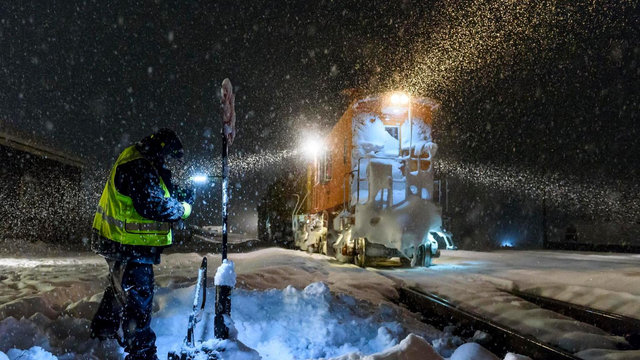
September 21, 2023
Rail Safety Requires A Total Commitment to Follow Rules and Look Out for Each Other

Early in my railroading career, I worked for a short line in Livingston, Montana. One chilly, calm night we were switching bad order cars into the car shop. It was a night where everything was silent, the noise dampened by snow.
While the rest of the crew kicked cars into various inbound tracks to the shop, I was lining switches, walking in the red zone between the rails — a deadly practice that was wrong, stupid and lazy. However, the danger didn’t register, maybe because I was certain I was not in a live track.
As I walked down the lead, I stepped out of the red zone toward another switch. At that instance, a car silently rolled by. I could feel its draft on my face. I sat in the snow and thought how my life could have markedly changed, if not ended! I made a commitment to myself then and there that no matter the working conditions — fatigue, cold, rain, snow or whatever else came my way — I was going to abide by every Operating rule to the best of my ability. Period.
Fast forward nearly 20 years, I was working as superintendent on the former Twin Cities Service Unit. On my way to a meeting in Omaha, I decided to drive down I-35 through Mason City and Des Moines, Iowa, to assess how well managers were performing safety activities. That night in Omaha, I was awakened by a call that a Mason City employee was seriously injured in a switching incident. My mind raced back to my Montana experience.
A beloved employee nicknamed “KGB” had been coupled-up. KGB was respected, hardworking and truly loved by all.
EMS took KGB to the hospital, where he was declared deceased. Afterward, managers and I conducted a reenactment based on crew interviews and data downloads. It concluded two tank cars that had been kicked up track three did not go to a hook; as KGB replaced a knuckle on the cars still attached to the locomotives, the tank cars rolled back on top of him.
After the investigation concluded three days later, I returned home to the Twin Cities only to be immediately informed we had struck a Canadian Pacific train during an interchange move, resulting in a signification derailment… in Mason City.
I drove back to Mason City to rerail and conduct the investigation, the whole time blaming myself for the incident. I had failed the team. I had not taken time to discuss the previous incident with everyone who so loved KGB. I had not paused to “reset” everyone’s thinking and refocus the team on the truest form of caring — looking out for one another. Everyone in the yard had been distracted, and miscommunication likely contributed to the train strike and derailment. This time, I would not make the same mistake and proceeded with safety standdowns. We talked, and I learned that we all process information and deal with grief in different ways. Some need to talk; others just need to think.
KGB’s funeral was two weeks later in Des Moines, which I attended along with many Union Pacific managers. In the church, I saw KGB’s wife and three young children who were crying, looking lost and clinging to their mother. It’s a sight I will carry with me to my last breath. While I had done everything I needed to in the aftermath of the incident, I never really took time to process. It hit me hard watching his family. I swore to my Maker I would do whatever it took to prevent team members from experiencing injuries, or worse.
Every Operating manager who has experienced this type of incident is absolutely dedicated to safety. It’s human nature that we just don’t really “get it” until we live it. My challenge as Chief Safety Officer is to encourage everyone to see the risks and do something about it. The easiest way is to follow the rules.
Prior generations left a roadmap to better safety because each rule has been written as the result of an incident like what happened in Mason City. I don’t know a single Union Pacific employee who doesn’t care, isn’t smart, and doesn’t approach their livelihood with pride and commitment. We truly are a remarkable collection of individuals because working in this industry requires exceptional people. We work day and night, in all types of weather, and under the governance of a vast array of operating rules and federal regulations moving the freight that makes the United States the best country on the planet. This industry is not for the mentally weak or self-centered.
We can be the best in safety because we have been there before. We have exceptional people with the right safety focus. It’s something we all can unite around because we care for each other. If we accept nothing less than total commitment, we can return to being the safest railroad in our history.